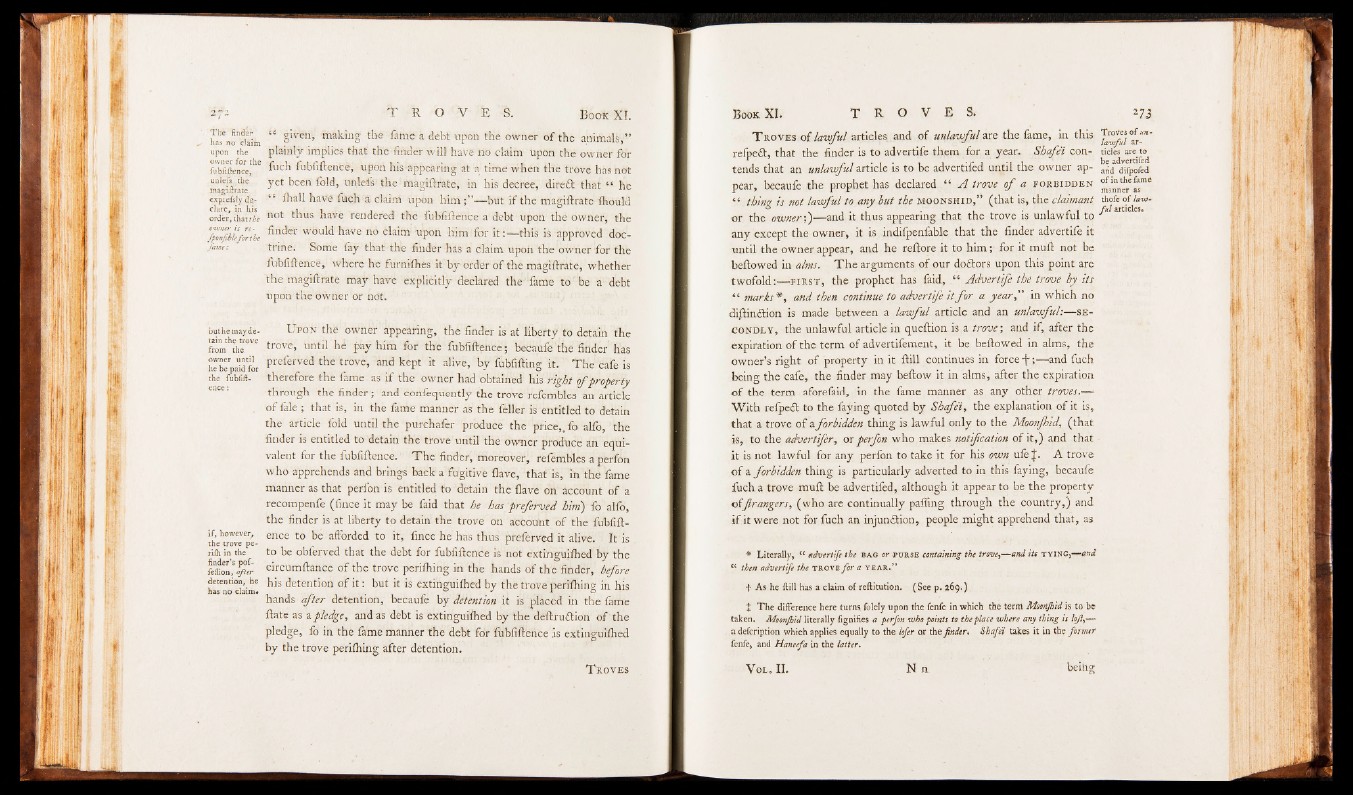
The finder
has no claitn
upon the
owner for the
fubfiftence,
unlefs the
magiftrate
exprefsly declare,
in his
order, that
fpoufbkfor the
Jame:
but he may detain
the trove
from the.
owner until
he be paid for
the fubiift-
ence:
if, however,
the trove pe-
rilh in the
finder’s pof-
feflion, after
detention, he
has no claim«
“ given, making the fame a debt upon the owner of the animals,”
plainly implies that the finder will have no claim upon the owner for
fuch fubfiftence, upon his‘appearing at a time when the trove has not
yet been fold, unleis the magiftrate, in his decree, dired that “ he
“ lhall have fuch a claim upon him — but if the magiftrate Ihould
not thus have rendered the fubfiftence a debt upon the owner, the
finder would have no claim upon him.for it:— this is approved doctrine.
Some fay that the finder has a claim upon the owner for the
fubfiftence, where he furnilhes it by order of the magiftrate, whether
the magiftrate may have explicitly declared the'fame to be a debt
upon the owner or net.
U p o n the owner appearing, the finder is at liberty to detain the
trove, until he pay him for the fubfiftence ; becaufe the finder has
preferved the trove, and kept it alive, by fubfifting it. The cafe is
therefore the fame as if the owner had obtained his right o f property
through the finder; and confequently the trove refembles an article
of fale ; that is, in the fame manner as the feller is entitled to detain
the article fold until the purchafer produce the price,, fo alfo, the
finder is entitled to detain the trove until the owner produce an equivalent
for the fubfiftence. The finder, moreover, refembles aperfbn
who apprehends and brings back a fugitive flave, that is, in the fame
manner as that perfon is entitled to detain the flave on account of a
recompenfe (fince it may be faid that he has preferved him) fo alfo,
the finder is at liberty to detain the trove on account of the fubfiftence
to be afforded to it, fince he has thus preferved it alive. It is
to be obferved that the debt for fubfiftence is not extihgmfhed by the
circumftance of the trove perifhing in the hands of the finder, before
his detention of i t : but it is extinguifhed by the trove perifhing in his
hands after detention, becaufe by detention it is placed in the fame
flats as a pledge, and as debt is extinguifhed by the deftrudion of the
pledge, fo in the fame manner the debt for fubfiftence is extinguifhed
by the trove perifhing after detention.
T roves
T roves of lawful articles, and of unlawful are the fame, in this
refped, that the finder is to advertife them for a year. Shafci contends
that an unlawful article is to be advertifed until the owner appear,
becaufe the prophet has declared “ A trove o f a forbidden
“ thing is not lawful to any but the moonshid,” (that is, the claimant
or the owners)— and it thus appearing that the trove is unlawful to
any except the owner, it is indifpenfable that the finder advertife it
until the owner appear, and he reftore it to him; for it muft not be
beftowed in alms. The arguments of our dodors upon this point are
twofold:— first, the prophet has faid, “ Advertife the trove by its
“ marks*, and then continue to advertife it fo r a y e a r f in which no
diftindion is made between a lawful article and an unlawful:— secondly,
the unlawful article in queftion is a trove; and if, after the
expiration of the term of advertifement, it be beftowed in alms, the
owner’s right of property in it ftill continues in f o r c e — and fuch
being the cafe, the finder may beftow it in alms, after the expiration
of the term aforefaid, in the fame manner as any other troves.—
With refped to the faying quoted by Shafci, the explanation of it is,
that a trove of a forbidden thing is lawful only to the Moonfhld, (that
is, to the advertifer, or perfon who makes notification of it,) and that
it is not lawful for any perfon to take it for his own ufe £. A trove
of a forbidden thing is particularly adverted to in this faying, becaufe
fuch a trove muft be advertifed, although it appear to be the property
offirangers, (who are continually palling through the country,) and
i f it were not for fuch an injundion, people might apprehend that, as
* Literally, “ advertife the BAG or p u r s e containing the trove,— and its TYING,— and
then advertife the t r o v e for a t e a k .**
f A s he ftill has a claim o f reftitution. (See p. 269*)
J T h e difference here turns folely upon the fenfe in which the ternl Moortjhid is to be
taken. Moonjhid literally fignifies a perfon nx)ho points to the place where any thing is lofl,—
a defcription which applies equally to the lofer or the finder% Shafe'i takes it in the former
fenfe, and Haneefa in the latter.
N n
Tropes o f unlawful
articles
are to
be advertifed
and difpofed
o f in the fame
manner as
thofe o f lawfu
l articles»
VOL. II. beiiig